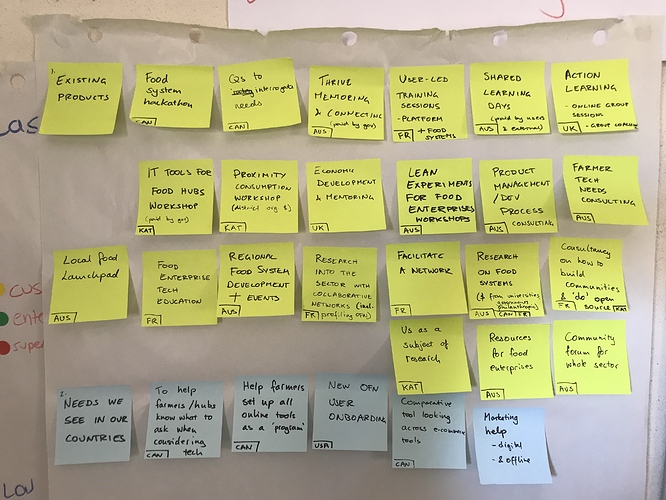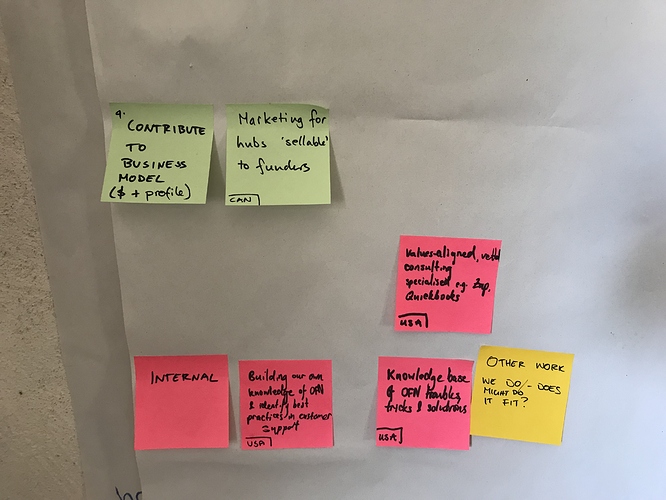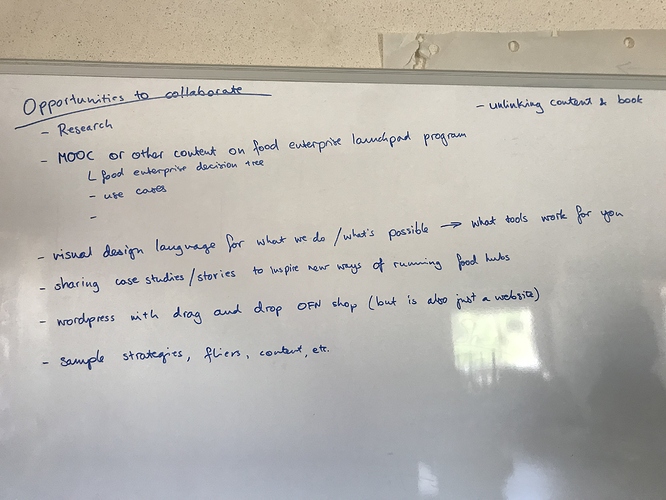As part of our global gathering, we will be having a discussion on whether we need a global non-tech product strategy. The notes for this session will be recorded below, but here is the initial session proposal and proposed session outline.
Session proposal
At our last global gathering we confirmed that we are more than one software platform. Amongst other things we are also about education and resources that support community food enterprises. We want to help food enterprises learn from each other’s experiences, and make it easier for people to run community food systems enterprises.
Many Open Food Network instances create additional non-tech products such as training, mentoring, incubation, hub support, etc.
What other non-tech products do we think would help? What do we want to create? What products would also benefit us in other ways? (e.g. by promoting us to a broader audience, or building a larger user base). How we can we create products such as this that build on each others’ work rather than replicate it in each instance? Do others see this as part of what we do?
Session plan
- Let’s map what products are already being created.
- What needs do we see in each of our countries for non-tech products?
- How we can work together internationally to create these types of products in a way that means we’re building on each others’ work, and cross-pollinating good ideas.
- Which of these products can contribute to our instances’ business models?
- What should our first products be?
Some additional points to cover if we have time: Are there also possibilities of networking our software users between countries for peer support? Can we undertake research across countries that can help our users internationally? What research is needed/would help?
By the end of this session it would be good to know:
- whether there is an appetite to work together as an international community on non-tech products.
If there is:
- how will we determine our way of working or our first products? What are our next steps? Is this part of how we describe Open Food Network’s value? Do we have products that we can immediately start collaborating on?
For those who are attending virtually, could you please do some pre-work of answering the numbered questions above by Thursday midday French time so that we can adequately include your work and your instances’ needs?
@tschumilas @lauriewayne1 @MSFutureFarm @luisramos0 @Theodore
Who is facilitating? @Jen
Who is scribing? @gen.shanahan
Summary:
Actions:
- Schedule a working session on shared resources (e.g. use cases) to put on the global site
- Schedule a working session on adding website templates and training templates to the OFN GitBook
- Rename OFN GitBook/Contributor Handbook: “How to OFN”
- Kirsten and Myriam - visual design language first attempt
- Establish a new standing item on the Global Hangout re: new products/services
- Make a decision on case study format
- Jen to drive product team meetings once every 2-3 months
Detailed notes:
Kirsten: The boundaries between OFN and the other work we’re doing are sometimes blurry - so maybe we can discuss where those boundaries should be (e.g. $4M funding application just submitted today re: soil carbon in Australian farms - how does OFN relate to this)
Kirsten: OFN can provide bespoke services to fulfill farmers’ tech needs - whether using the OFN platform or otherwise.
Myriam agrees - side services don’t necessarily need to involve the OFN platform
Rachel: people need tools but they also need our expertise regarding what options exist, what issues to consider - internet education, not just training
Existing Products
- Food system hackathon (CAN)
- Research into distributed food systems as a way of developing the informal economy (CAN)
- Finding women working at home who want to create food buying groups
- E-commerce platform comparison tool (CAN)
- So far it’s primarily a list of questions to ask of platforms
- Took an existing comparison list, simplified for prospective food hubs, added relevant ethical questions
- Difficult to keep substantive information up to date as the platforms change so quickly
- Thrive mentoring program (AUS)
- User-led training sessions (FR), shared learning days (AUS)
- covers the platform and the general context of the food system, all the questions one needs to ask oneself when establishing a food hub
- training is a great win-win as we’re paid for the training and we gain new users
- Action learning (UK)
- Online group session - every month for 6 months
- Workshops funded by public money / cooperative federations (CAT)
- e.g. walkthrough on all IT for foodhubs - including OFN ; proximity consumption workshops
- Few 1000 euros for 2 sessions
- Got this work without solicitation, so could probably get more if advertised as a service OFN offers
- Noone attended - public administrators have the money for this, but they don’t know how to reach the people
- Economic development mentoring (UK)
- Specialist advisors database
- economic development mentoring
- Subscription model
- Paid well - long-term relationship
- Lean experiments workshop (AUS)
- teaching food enterprises to use lean experiments for their projects
- 2-hour session to develop their first experiment
- Ongoing work to support the experiment
- Consulting / Sector development
- Product management / dev process consulting (AUS)
- Consulting re: farmer tech needs (AUS)
- $5000 for a day of strategy building and OFN and interoperability (Zapier) setup
- Food enterprise consulting (FR)
- Facilitating a network and research project (FR)
- really good relationship with the major agricultural research institute in France
- anarchist researcher on short-food chains, loves OFN
- hosting OFF and DFC within a wider network on short food-chains in France
- Research day for this network with workshops on digital and sales/logistics/transparency, etc.
- Helping to overcome the knee-jerk rejection of digital within the short food-chains sector
- Research through Open Food Services (OFS) (AUS)
- Migrating Jen and Kirsten’s jobs at Uni of Melbourne into their own org
- charging the client what the university charges, putting the surplus into the global pot
- e.g. Research on land use, soil carbon
- How might tech support small and medium farmers (CAN)
- Local Food Launch Pad (AUS)
- 12-session program to guide food enterprises through launching with food systems thinking
Jen: Products have two purposes - profile and revenue
Myriam: knowledge sharing through writing articles as a marketing strategy - gaining new users
Kirsten: we should share knowledge freely - this is part of OFN’s purpose - moving towards a society that correctly values abundance and scarcity. Where there’s a cost is in our time and effort.
Rachel: I absolutely agree with the principle of not charging for knowledge. Giving the knowledge for free in articles etc. doesn’t impede us from gathering and publishing together afterward (e.g. through crowdfunding)
Opportunities to Collaborate
- Research
- MOOC or other content on food enterprise lanchpad program
- Myriam: include a decision tree?
- Theresa highlights how new food hubs are developing simultaneous to exploring the software, so shaped by the options we can present them.
- Nick points out that this is true of new food hubs, but a decision tree often is useful for established enterprises.
- Rachel highlights that Food Assembly has 1 model, which makes it easy to scale. OFN’s more flexible approach makes scale more challenging.
- Jen: the launchpad is really about sector development - making sure that the users suited to OFN find it, and others find the appropriate alternative platforms.
- Kirsten: ideally we could have a simplified, lego-like way of visualizing different models and configurations
- Knowledge sharing through articles / books
- Aggregation and distribution of Best of OFN products
- Visual design language for what we do / what’s possible - what tools work for you
- Sharing case studies / stories to inspire new ways f running food hubs
- Wordpress with drag and drop OFN shop (but it’s also just a website)
- Sample strategies, flyers, content, etc.
Needs we see in our countries
- A well-organised user guide, built around specific use cases (US)
- Food-buying groups
- Theresa - this is a market we can address
- Kirsten - we don’t really have a user-friendly way of transforming products, central to the food buying group use case - requires the DFC work
- So this is a software issue, beyond the scope of this session
How do we be more collaborative about this going forward?
- a Discourse thread
- a standing item on the Global Hangout
- a section on the public-facing global website
Let’s try identifying 5-10 potential products -ease-value matrix
Rachel asks whether we mean to experiment at the global or local level? Maybe this is another dimension


